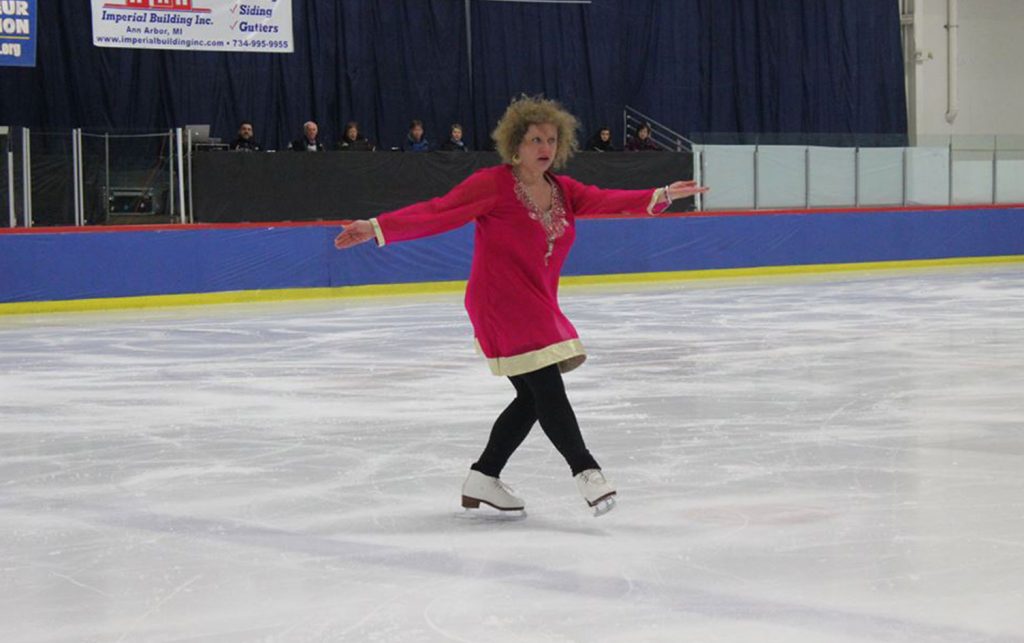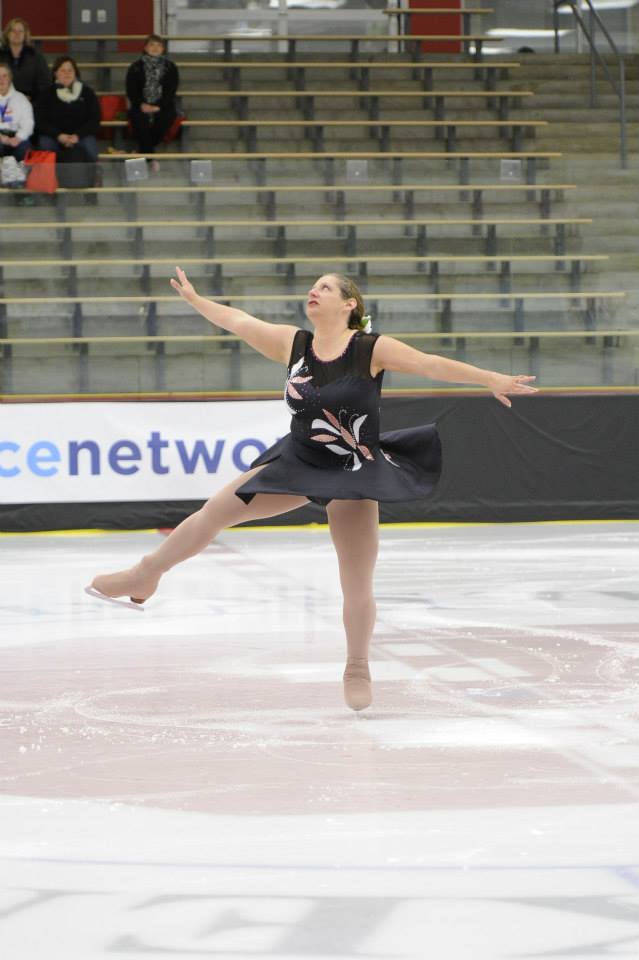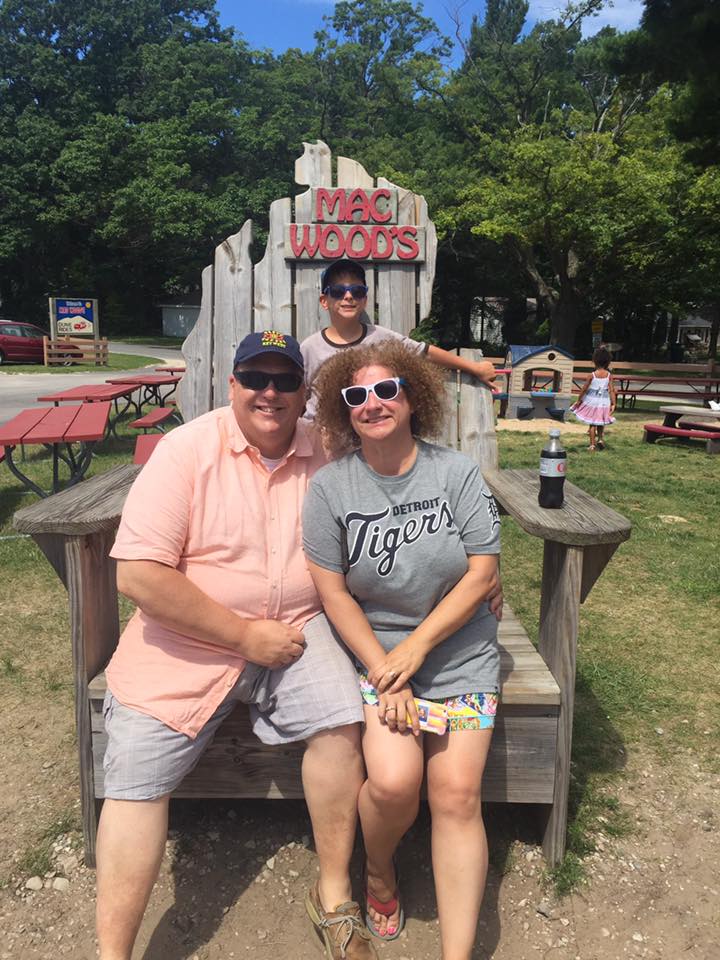
Most figure skaters start the sport when they’re kids, learning the many complicated techniques at a young age. But most figure skaters are not Melissa Garland.
As a kid growing up in Michigan, the 48-year-old Garland loved to watch American figure skater Dorothy Hamill and dreamed of lacing up skates of her own. Unfortunately, her flat feet and subsequent corrective shoes put a damper on her dreams. She was one of three kids, and her father struggled to pay for the expensive braces, podiatry appointments and eyeglasses. There was wasn’t much left at the end of the month to put toward skating.
“I always wanted to skate,” says Garland, who now lives in Grand Rapids, Michigan. “But my Dorothy Hamill dreams had to be put on hold.”
And on hold they were — for nearly two decades. Then, at age 28, she finally put on those skates.

She recalls watching a skating competition on TV one day with her mother-in-law, and the commentators kept talking about the oldest competitor in the event — who was an “elderly” 26! Her mother-in-law pointed out how close in age she was to Garland and told her, “You could do it, too.” When the conversation shifted toward Christmas gifts, the item atop Garland’s list was obvious.
It was no surprise when she found ice skates under the tree that year and soon signed up for a six-week learn-to-skate class.
That was 20 years ago, and Garland is still at it.
 Every dreamer deserves support. Discover inspiring tips, tools and stories of dreamers like you to help kick-start your own dream pursuit.
Every dreamer deserves support. Discover inspiring tips, tools and stories of dreamers like you to help kick-start your own dream pursuit.
“I struggled in the beginning,” she admits. At first, she couldn’t even figure out how to skate backwards, a very important technique in competition. She told herself if she couldn’t figure it out by the end of the six-week class, she would chalk skating up as a sport that just wasn’t for her. Then, during week five, it finally came together.
“Then I wanted to know ‘what’s next!’” she says. She wanted to try spirals, lunges and even more tricks. “I was like a junkie,” she jokes.
Soon Garland was signing up for more lessons, practicing constantly, reading internet message boards on the topic and making skating friends. One of those friends suggested she volunteer at the U.S. Adult Figure Skating Championships in Michigan that year. What she saw blew her away.
“I wanted to do it and be there,” she says. She remembers making a promise to herself that she would one day make it to nationals.
Unfortunately, qualifying wasn’t so easy. Just to be eligible for consideration, skaters are required to pass a series of difficult skill tests. After a few years of training, Garland passed her first skill test in 2000. The second took a few more years and she passed in 2003, followed closely by a third test in 2004. A year later, she competed at the 2005 U.S. Adult Figure Skating Championships.
Since then, she’s competed eight times, and made appearances at the Ice Skating Institute Championship and Michigan state championship. She has also passed higher level skills tests and is working on passing the highest level test.
Making her skating career all the more improbable, however, were the off-the-ice challenges Garland encountered along the way. In 2002, Garland was diagnosed with polycystic ovarian syndrome (PCOS), a hormonal disorder that made it difficult to conceive a child — something she strongly desired. The side effects also included weight gain, despite all of her training, and becoming pre-diabetic.
“Every time, you feel like you’ve conquered something, there’s something else,” she says.
In 2012, her dietician reviewed her diet and informed her the fat-free foods she was eating were full of sugar, which isn’t beneficial for a diabetic. “I was so aghast,” says Garland. She immediately downloaded MyFitnessPal and started tracking her food intake. The app helped her make decisions about her meals beforehand, and eventually, she dropped from a high of 214 pounds to 161 pounds. Now, in addition to tracking her meals, she also uses the app to track the amount of sodium in foods, a stat her doctor asked her to keep an eye on.
Despite her health struggles and late entrance to the skating world, Garland has seen many successes in the sport. Earlier this year, she took home three medals — a gold, silver and bronze — at the State Games of America, just three months after undergoing a hysterectomy as a result of PCOS.
“It was the most satisfying skate I’ve had,” she says, remembering how hard she’d worked to get back into shape post-op (with her doctor’s approval, of course) and how perfectly she nailed her routine. Plus, she’d had to fit in the competitions that day between doctor’s appointments and work.
“All the competitors are other adults with jobs or kids or other commitments,” says Garland. “All the hard work is just rewarding for yourself. You’ve got to do it for yourself. The ice is for you.”

Garland credits her husband, David, for being so supportive of her skating — even when she was years away from being any good. They trade off being involved in each other’s activities (he races snowmobiles and motorcycles) and taking their son, Will — who she had in 2009 with the help of fertility treatments — to baseball games and school.
Garland knows she’s not always expected a win at her various competitions. “Sometimes you’re first and sometimes you’re last,” she says. When she came in last place at finals one year, a friend made her a trophy, and it sits next to all the medals she won in other years. It makes her laugh. “Even though I came in last, I was there.”
Written by Kelly O’Mara, a professional triathlete and reporter outside San Francisco, where she is an on-call producer for the local NPR station. Her work appears regularly in espnW, Competitor, Triathlete and California Magazine.
The post How Melissa Made Her Ice Skating Dreams Come True appeared first on Under Armour.
(via MyFitnessPal Blog)






